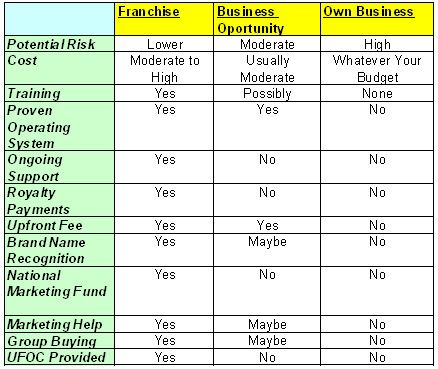
If you’ve ever dreamed of owning your own business, you’re not alone. The desire for the autonomy and financial security that being your own boss can provide has never been more prevalent than it is today. There are many reasons for this but a main one would have to be that as big business gets bigger, the value of the individual employee is diminished and people are fed up with being disposable. Owning a business is a great way for a woman to take charge of her future.
One way to become a business owner is through franchising and the franchise industry is at an all-time high. There are more franchised businesses than you can possibly imagine. A recent survey found almost 500 concepts in fast food alone, a category that represents only 20% of U.S. franchises. The IFA Educational Foundation’s Economic Impact of Franchised Businesses study indicates there were three quarters of a million franchised businesses in 2001.*
There are other ways to become a business owner, include buying a business opportunity and creating a business from the ground up. There are definite advantages and some disadvantages to owing a franchise business over these other business ownership options and the franchise model is not right for everyone.
To see if franchising could be right for you, compare your previous business experience, your motivations and your current situation to the following examples.
Franchise Ownership
Let’s imagine that you are in your early 40s and have worked for a half a dozen large companies over the last 20 years. You’ve been recently laid off but even before the layoff, you realized you desperately wanted to change careers and find something that would allow you to use a larger skill-set and provide a greater income. Your company has given you a cash settlement and you are keen to take charge of your life, become your own boss and try something different. You want a good income and are willing to put in whatever hours necessary to jump start the new career but your overall goal is to eventually work reasonable hours and have more time for yourself and your family.
If your history is similar, you are probably an excellent candidate for franchise ownership. This path will allow you to benefit from a proven system of operations and a training program that will quickly get you up and running. As you have no previous business ownership experience, the ongoing support you will receive from a franchisor will be vital to your success. Many franchise opportunities offer a turnkey package that will include almost everything you need to start your business. In addition, most franchisors require no previous experience in their industry so you can be open to a variety of types of businesses and won’t need to stick to the one industry you know.
Another advantage to franchising is that franchisees can take advantage of lower cost materials due to group buying power. They also learn from each other and usually form a peer support system. Because you won’t be occupied with every minute detail of owning a business, you will be able to concentrate on growing your business.
Franchisors learn from their franchisees and use this information to continually improve their systems. Data from other franchisees can be used to help you predict your break even timeframe and franchisors are required to provide you with a UFOC (Uniform Franchise Offering Circular), which will help you learn about the company, the officers, the current franchisees, and any litigation against the company.
Franchising is a business model that works very well for those who have previously been in middle or upper management – particularly women as they are historically more likely to comply with a franchisor’s rules. Women, many franchisors report, are also quicker to see the value of using a proven system and less likely to waste time trying to fix something that’s not broken.
Compliance with a franchisor’s rules can also been seen as a disadvantage to franchise ownership. A franchise lets you be in charge as long as you follow and adhere to all of the elements of the franchise system. This is necessary so that the franchisor can offer consistency across the brand – and let’s face it, they’ve done the research and tested the procedures so their way is usually the right way. This is also a benefit to the consumer who can expect comparable quality products or services no matter which franchisee he patronizes, anywhere across the country or around the world.
Another perceived disadvantage is that a franchisee must pay royalties and sometimes a marketing fee to the franchisor. Royalty payments are compensation for everything the franchisor provides, including access to the brand, the operating system and related items. The franchisor uses the marketing fee to provide national advertising to build the brand and drive market penetration at a greater level than a franchisee could do on her own. Also, national marketing funds enable franchisees to benefit from professionally produced marketing materials and realize efficiencies from commingled funds.
If your are comfortable learning from others who have experienced success and would rather follow a proven trail than bushwhack your way through the jungle, buying a franchise could help you achieve your personal and financial dreams. However, if you’re the type of woman who likes to run with scissors and would never stop to ask directions, there may be better options for you. Read on!
Buying a Business Opportunity
As another example, let say that a varied work history has given you some great skills which you wish to put to use running your own business. You are not concerned about the type of business you buy but want to have freedom to run it your way. You would be okay with a certain degree of risk but also recognize the advantages of an established system of operations.
A business opportunity is a business you buy outright and have the freedom to run any way you choose. The benefit of a business opportunity is that they generally provide you with a successful business model and possibly some training and marketing assistance. The initial investment is usually lower than for a franchise and there are no ongoing royalty payments.
A downside to a business opportunity is that the seller isn’t as invested in your success or failure as is a franchisor because they make their money up front. Therefore, you won’t have extensive ongoing training, assistance, a national marketing program, research and development, etc. The risk factor is probably greater than for owning a franchise but could be less than starting your own business.
Starting Your Own Business
In this third scenario let’s assume that you have a steady, predictable income, perhaps from a working spouse or other source. You think of yourself as a truly entrepreneurial woman and you are brimming with ideas for new products or services and love to “tinker” with things until they are just as you want them. You are strongly attracted to the idea of being your own boss and don’t like to answer to others. You’ve previously been a business owner and have enjoyed the experience. You have the drive to follow through on your plans and have a background in a variety of disciplines, including sales, marketing, accounting and management, so you are not looking for outside support. In addition, you have plenty of money to spend on researching and developing your product/service so a predictable timeframe for break even isn’t a concern.
If you are like this type of person, one who likes blazing her own trails, franchise ownership is not for you. Instead you will be more comfortable setting up your own business using your own ideas. This is the most risky way to become your own boss because you will not have the proven operations system, nationwide brand and marketing, and the ongoing support of a franchise company. You may also have more difficulty obtaining business loans and the time from inception to when you start turning a profit will be hard to predict. On the plus side, you will owe no royalties and can run you business just as you please.
Historically this is the model least likely to succeed on average so it is recommended only for truly exceptional individuals who have the desire and stamina to start their own business based on their own unique idea or approach.
The chart below will help you compare the advantages and disadvantages of these three types of business ownership opportunities. For a majority of people, franchising has proven to be a viable way to become a business owner. For the most part it offers the lowest risks and the highest level of support. Because a franchisor doesn’t succeed until the franchisees do, you’ll find a team of dedicated professionals willing and able to help you every step of the way, from site selection to employee hiring to grand opening. They will keep in touch with you from the very beginning to years down the road and have web sites, toll free numbers and dedicated staff to make sure all your questions are answered quickly.
But it takes the right sort of person to be a happy and successful franchisee. Before you become too involved in the process of finding a business to buy, carefully consider which type of opportunity will be right for you. It can make all the difference between the success and failure of your new venture.
Business Ownership Comparisons

* IFA Educational Foundation-FRANdata study released August 2006
 Kim Ellis is the President of Bison.com, a leading online resource for franchise and business opportunities. She has been quoted as an industry expert in USA Today, Wall Street Journal and a variety of local and regional publications regarding trends in business and franchising. Kim combines her entrepreneurial spirit with a diverse background in marketing and operation to help others succeed in franchising.
Kim Ellis is the President of Bison.com, a leading online resource for franchise and business opportunities. She has been quoted as an industry expert in USA Today, Wall Street Journal and a variety of local and regional publications regarding trends in business and franchising. Kim combines her entrepreneurial spirit with a diverse background in marketing and operation to help others succeed in franchising.
One reply on “Do You Follow Marked Trails or Bushwhack Through the Bush?”
Excellent! Really I have had a very good time in reading your wonderful thoughts. The chart you provided below is also much helpful to me.
Thanks for your post.